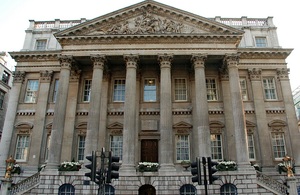Chancellor uses Mansion House speech to set out bank recovery plan
Chancellor sets out next stage of government’s plan to take the banking system from rescue to recovery.

Delivering his annual Mansion House speech to the banking community, the Chancellor of the Exchequer, George Osborne outlined the government’s plan for the partly-state owned banks, RBS and Lloyds.
He told the audience that although the economic news has been “better in recent months” and that while “Britain has left intensive care, we still need to secure the recovery”.
The Chancellor reassured the audience that the government won’t let up in its “determination to put right what went so badly wrong”.
“Nothing better signals Britain’s move from rescue to recovery than the fact that we can start to plan for our exit from government share ownership of our biggest banks”, he said.
In order to ensure a stable future for the state owned banks, the Chancellor outlined three objectives that will guide the government’s approach:
“We want to maximize the ability of these important banks to support the British economy.
“We want to get the best value for money for the taxpayer.
“And we want to do what we can to return them to private ownership.”
Although the Chancellor did not announce a fixed timetable or price for the return of the banks to the private sector, he said that the government is “actively considering options for share sales in Lloyds.”
The first sale is likely to be an institutional one, but for subsequent disposals the government will consider all options, including a retail offering to the general public.
On RBS the Chancellor made clear that the government will only sell when they feel the bank is fully recovered, and that moment is “some way off”.
However the government will “urgently investigate the case for taking the bad assets…out of RBS”.
Drawing back to the government’s three objectives, he said a bad bank will only be created if it can meet them.
“We will establish a bad bank if it meets our three objectives: if it would accelerate the path back to private ownership, deliver benefits for the wider economy and be in the interests of taxpayers.
“But if the review reveals that it would not achieve these things, then we won’t do it.”
On the timetable for the review, the Chancellor said we “want to get on with this, so we’ll conclude the review and make a decision this autumn.”
Commenting on the announcement by the Office of Fair Trading (OFT), that it is bringing forward its market review of small business banking, the Chancellor said he has asked the OFT to review the impact that new challenger banks created by Lloyds and RBS will have on “strengthening competition in small business banking”, and to identify what more can be done.
Responding to the publication of the report from the Parliamentary Commission on Banking Standards (Tyrie report), on professional standards and culture of the UK banking sector, the Chancellor said it was an “intensive and thorough piece of work”.
A full government response to the report will be published before the summer recess, but the Chancellor said that where legislation is needed, “the Banking Bill currently before Parliament will be amended to ensure the recommendations can be quickly enacted”.